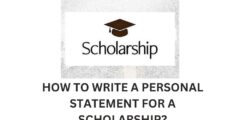Scholarships are a valuable resource for students seeking to further their education. They provide financial assistance and recognition for academic achievements, making it possible for students to attend prestigious universities and pursue their dreams. However, many students are unaware of the potential consequences that come with receiving a scholarship. One of the most common concerns is whether a scholarship can be taken away. In this article, we will explore the various reasons why a scholarship may be revoked and what students can do to protect their scholarship.
Contents
Understanding Scholarships
Before delving into the topic of whether a scholarship can be taken away, it is important to understand what scholarships are and how they work. Scholarships are financial awards given to students based on various criteria, such as academic merit, financial need, or specific talents. They can be provided by universities, private organizations, or government agencies.
Unlike loans, scholarships do not have to be repaid, making them a highly sought-after form of financial aid. They can cover tuition fees, living expenses, and even provide additional funds for books and supplies. Scholarships can be renewable, meaning they are awarded for multiple years, or one-time awards for a specific academic year.
Read:How Do you apply to scholarships?Receiving a scholarship is a great achievement and can open doors for students to pursue their education without the burden of financial stress. However, it is important to note that scholarships come with certain responsibilities and expectations that students must meet to maintain their award.
Reasons Why a Scholarship Can Be Taken Away
While scholarships are typically awarded for the duration of a student’s academic program, there are certain circumstances that may lead to the revocation of the scholarship. These reasons can vary depending on the scholarship provider and the terms and conditions of the award. Here are some common reasons why a scholarship may be taken away:
1. Failure to Meet Academic Requirements
One of the most common reasons for a scholarship being revoked is the failure to meet academic requirements. Most scholarships have a minimum GPA requirement that students must maintain to continue receiving the award. If a student’s grades fall below the required GPA, they may risk losing their scholarship.
For example, the University of California, Berkeley, has a scholarship renewal policy that requires students to maintain a minimum GPA of 3.0 to continue receiving their scholarship. If a student’s GPA falls below this threshold, they may lose their scholarship for the following academic year.
Read:Can you cash out scholarships?It is important for students to understand the academic requirements of their scholarship and work towards meeting them to avoid the risk of losing their award.
2. Changes in Financial Circumstances
Some scholarships are awarded based on financial need, and if a student’s financial circumstances change, they may no longer be eligible for the scholarship. For example, if a student’s family experiences a sudden increase in income, they may no longer qualify for a need-based scholarship.
In such cases, the scholarship provider may reassess the student’s financial situation and revoke the scholarship if they no longer meet the eligibility criteria. It is important for students to inform their scholarship provider of any changes in their financial circumstances to avoid any potential issues.
3. Violation of Scholarship Terms and Conditions
Scholarship providers often have specific terms and conditions that students must adhere to in order to maintain their award. These terms and conditions may include maintaining a certain GPA, participating in extracurricular activities, or completing a certain number of community service hours.
If a student fails to meet these requirements or violates any of the terms and conditions, their scholarship may be revoked. For example, the Coca-Cola Scholars Foundation requires its recipients to maintain a minimum GPA of 3.0 and participate in a leadership development program. Failure to meet these requirements may result in the revocation of the scholarship.
Read:How Do you get a football scholarship?4. Misrepresentation of Information
When applying for scholarships, students are required to provide accurate and truthful information about themselves. This includes academic achievements, financial information, and personal background. If a student is found to have misrepresented any information on their scholarship application, their award may be revoked.
For instance, if a student falsifies their financial information to qualify for a need-based scholarship, they may risk losing their award if the scholarship provider discovers the deception.
5. Dropping Out of School
Most scholarships are awarded to students who are enrolled in a specific academic program. If a student decides to drop out of school or change their program without informing the scholarship provider, they may lose their award.
For example, the Gates Millennium Scholars Program requires its recipients to maintain full-time enrollment in an accredited college or university. If a student drops out of school or changes their enrollment status without notifying the program, their scholarship may be revoked.
What to Do If Your Scholarship Is Taken Away
If a student’s scholarship is taken away, it can be a devastating blow. Not only does it affect their finances, but it can also impact their academic progress and future plans. However, there are steps that students can take to appeal the decision or find alternative sources of funding.
1. Understand the Reason for Revocation
The first step in dealing with a revoked scholarship is to understand the reason behind it. Students should reach out to the scholarship provider and ask for an explanation. This will help them understand what went wrong and if there is any possibility of appealing the decision.
2. Appeal the Decision
If a student believes that their scholarship was revoked unfairly, they can appeal the decision. This involves writing a letter to the scholarship provider explaining the circumstances and providing any necessary documentation to support their case.
For example, if a student’s scholarship was revoked due to a sudden drop in their GPA, they can appeal by providing a valid reason for the decline, such as a family emergency or health issues. It is important to be honest and provide evidence to support the appeal.
3. Look for Alternative Sources of Funding
If the scholarship cannot be reinstated, students can explore other options for funding their education. This may include applying for other scholarships, grants, or loans. Students can also consider working part-time or taking on internships to cover their expenses.
It is important for students to be proactive and start looking for alternative sources of funding as soon as possible to avoid any disruptions in their education.
Conclusion:
Scholarships are a valuable resource for students, but they come with certain responsibilities and expectations. While it is possible for a scholarship to be taken away, students can take steps to protect their award and avoid any potential issues. By understanding the reasons why a scholarship may be revoked and being proactive in meeting the requirements, students can ensure that they continue to receive the financial assistance they need to pursue their education.
It is also important for students to be aware of the terms and conditions of their scholarship and to communicate any changes or issues to the scholarship provider. In case of a revoked scholarship, students should not lose hope and explore alternative sources of funding to continue their education. With determination and perseverance, students can overcome any challenges and achieve their academic goals.









